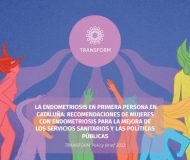

The project “Endometriosis in the first person: participatory research on the experiences and recommendations of women with endometriosis for the improvement of health services”, in which the Gynecology Service of the Hospital de la Santa Creu i Sant Pau – IIB Sant Pau has participated , is an innovative pilot that applies citizen science to women’s health within the framework of the European Project H2020 TRANSFORM. Women with endometriosis have been involved in it to delve into their experiences of the disease and their experiences regarding health services.
In the investigation, 20 patients diagnosed with endometriosis participated as co-investigators, having an active role in the data collection phases, in the formulation of recommendations and in the dissemination of the results.
Marta Fonseca has had endometriosis for 18 years, has undergone four surgeries and has participated in the pilot. “The fact of being in this group does not cure, but it helps a lot to share this experience and contribute to these recommendations. Yes, it is a complex disease, but if there are so many women who suffer from it, more attention must be paid to the various areas that endometriosis involves. You have to know that endometriosis exists and have better ways to deal with it with more informed professionals and resources dedicated to research.”
With the results of the research, a policy brief has been written for political decision-makers and health personnel, presenting the recommendations co-created by women for the improvement of health services.
The policy brief was presented yesterday at an event at the Hospital de Sant Pau that was attended by the women participating in the research and Gynecology professionals from the Hospital.
“The pilot and the policy brief aim to give voice and raise awareness about how endometriosis is experienced and its effects on people’s global health, as well as present recommendations to improve diagnostic and health care services.” Diana Reinoso, Project Manager at Science for Change.
The six general recommendations contained in the policy brief are:
1. Increase the degree of knowledge of endometriosis at the health level;
2. Develop strategies to achieve an early diagnosis of endometriosis;
3. Improve the process of transmitting information to patients to increase self-knowledge and contribute to shared decision-making;
4. Define and implement a comprehensive approach model for endometriosis;
5. Improve care for people with endometriosis in health services;
6. Develop more personalized treatment models that take into account the opinion of the patient.
The ultimate goal of the policy brief is to influence public health policies at regional and local level, and specifically, to influence the Endometriosis Care Model of Catalonia, in addition to the new model of innovative approach to the disease in the Hospital of Sant Pau.
Dr. Ramon Rovira, surgical coordinator of the Gynecology and Obstetrics Service of the Hospital de la Santa Creu i Sant Pau – IIB Sant Pau, in Barcelona, comments that “with the TRANSFORM project we have really put the patient at the center. It has been an opportunity, as a professional, to know first-hand what patients need and a possibility of radical improvement to face changes in the therapeutic approach to this pathology at all levels”.
In addition, he adds that the results of this initiative are “a clear example for new projects in different areas of health that allow a paradigmatic change in patient care, in general. Knowing what the patient needs is one of the obligations of the medical care of the future”.
For Nora Salas Seoane, Head of the Health Area of Science for Change, this pilot project is a clear example of how we can use citizen science, participatory strategies and co-creation in health to incorporate the patient’s experience and transform together with them certain health practices and their healthcare services.
“We are helping to understand women’s health from their perspective and their feelings, taking into account gender barriers in health. This pilot demonstrates that the patient’s experience is key and necessary to improve care services and influence the planning of health policies”, says Salas Seoane.